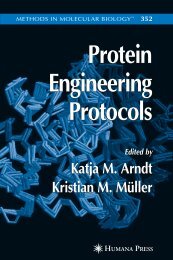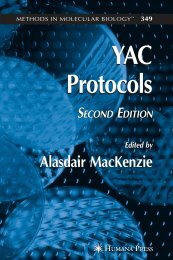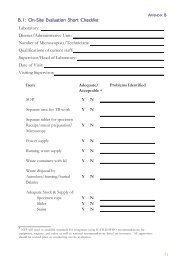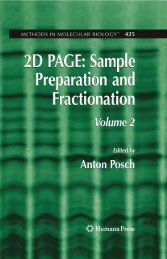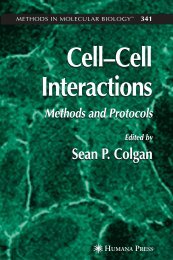- Page 2:
Affinity Chromatography second edit
- Page 6:
METHODS IN MOLECULAR BIOLOGY TM Aff
- Page 10:
To Tina, Emmanuella, Natalie, and A
- Page 14:
viii Preface Affinity tags for puri
- Page 18:
x Contents 10. Immobilized Metal Io
- Page 22:
xii Contributors Tzong-Hsien Lee
- Page 26:
2 Roque and Lowe cell extract conta
- Page 30:
4 Roque and Lowe groups critical in
- Page 34:
6 Roque and Lowe of reinforcement e
- Page 38:
8 Roque and Lowe unknown factors ar
- Page 42:
10 Roque and Lowe receptor domains
- Page 46:
12 Roque and Lowe A further issue o
- Page 50:
14 Roque and Lowe transgenic system
- Page 54:
16 Roque and Lowe 6. Arsenis, C. an
- Page 58:
18 Roque and Lowe 39. Burton, S.J.,
- Page 62:
20 Roque and Lowe 71. Bhikhabhai, R
- Page 66:
I Various Modes of Affinity Chromat
- Page 70:
26 Charlton and Zachariou Since the
- Page 74:
28 Charlton and Zachariou 5. Equili
- Page 78:
30 Charlton and Zachariou 9. Elute
- Page 82:
32 Charlton and Zachariou 3.3. Puri
- Page 86:
34 Charlton and Zachariou could als
- Page 90:
3 Affinity Precipitation of Protein
- Page 94:
Affinity Precipitation of Proteins
- Page 98:
Affinity Precipitation of Proteins
- Page 102:
Affinity Precipitation of Proteins
- Page 106:
Affinity Precipitation of Proteins
- Page 110:
Affinity Precipitation of Proteins
- Page 114:
Affinity Precipitation of Proteins
- Page 118:
Affinity Precipitation of Proteins
- Page 122:
4 Immunoaffinity Chromatography Stu
- Page 126:
Immunoaffinity Chromatography 55 2.
- Page 130:
Immunoaffinity Chromatography 57 A
- Page 134:
Immunoaffinity Chromatography 59 ab
- Page 138:
5 Dye Ligand Chromatography Stuart
- Page 142:
Dye Ligand Chromatography 63 Develo
- Page 146:
Dye Ligand Chromatography 65 6. Mis
- Page 150:
Dye Ligand Chromatography 67 Fig. 1
- Page 154:
Dye Ligand Chromatography 69 6. Sec
- Page 158:
72 Tugcu chromatography, the sorpti
- Page 162:
74 Tugcu non-specific interactions,
- Page 166:
76 Tugcu the salt counter ions on t
- Page 170:
78 Tugcu On a plot of log K versus
- Page 174:
80 Tugcu Figure 2B illustrates a ty
- Page 178:
82 Tugcu 2.5. Running Displacement
- Page 182:
84 Tugcu then the operating conditi
- Page 186:
86 Tugcu Table 1 Trobleshooting for
- Page 190:
88 Tugcu 23. Torres, A. R. and Pete
- Page 194:
II Affinity Chromatography Using Pu
- Page 198:
94 Roque and Lowe market, with 14 F
- Page 202:
96 Roque and Lowe and RasMol V2.7.1
- Page 206:
98 Roque and Lowe house using, for
- Page 210:
100 Roque and Lowe Gly71 and Gly72)
- Page 214:
102 Roque and Lowe dissolved in ace
- Page 218:
104 Roque and Lowe equilibration bu
- Page 222:
106 Roque and Lowe of color. Purple
- Page 226:
108 Roque and Lowe 5. Fassina, G.,
- Page 230:
8 Phage Display of Peptides in Liga
- Page 234:
Phage Display of Peptides in Ligand
- Page 238:
Phage Display of Peptides in Ligand
- Page 242:
Phage Display of Peptides in Ligand
- Page 246:
Phage Display of Peptides in Ligand
- Page 250:
Phage Display of Peptides in Ligand
- Page 254:
Phage Display of Peptides in Ligand
- Page 258:
9 Preparation, Analysis and Use of
- Page 262:
Preparation, Analysis and Use of an
- Page 266:
Preparation, Analysis and Use of an
- Page 270:
Preparation, Analysis and Use of an
- Page 274:
Preparation, Analysis and Use of an
- Page 278:
Preparation, Analysis and Use of an
- Page 282:
10 Immobilized Metal Ion Affinity C
- Page 286:
IMAC of Histidine-Tagged Fusion Pro
- Page 290:
IMAC of Histidine-Tagged Fusion Pro
- Page 294:
IMAC of Histidine-Tagged Fusion Pro
- Page 298:
IMAC of Histidine-Tagged Fusion Pro
- Page 302:
IMAC of Histidine-Tagged Fusion Pro
- Page 306:
IMAC of Histidine-Tagged Fusion Pro
- Page 310:
152 Godat et al. tag. HQ-tagged pro
- Page 314:
154 Godat et al. 2. NaCl (5 M). 3.
- Page 318:
156 Godat et al. 4. Invert tube to
- Page 322:
158 Godat et al. 3. Sonicate sample
- Page 326:
160 Godat et al. the above protocol
- Page 330:
162 Godat et al. 3.7.1. Purificatio
- Page 334:
164 Godat et al. 3. Adding 200 mM N
- Page 338:
166 Godat et al. 4. The MagneHis Ni
- Page 342:
168 Godat et al. 22. Lin, D., Tabb,
- Page 346:
170 Pattenden and Thomas 1. Introdu
- Page 350:
172 Pattenden and Thomas functions
- Page 354:
174 Pattenden and Thomas of the mal
- Page 358:
176 Pattenden and Thomas necessary.
- Page 362:
178 Pattenden and Thomas 2.4. Amylo
- Page 366:
180 Pattenden and Thomas 9. Thoroug
- Page 370:
182 Pattenden and Thomas 8. Collect
- Page 374: 184 Pattenden and Thomas binding ef
- Page 378: 186 Pattenden and Thomas 15. Cells
- Page 382: 188 Pattenden and Thomas 23. Martin
- Page 386: 13 Methods for Detection of Protein
- Page 390: Detection of Protein-Protein and Pr
- Page 394: Detection of Protein-Protein and Pr
- Page 398: Detection of Protein-Protein and Pr
- Page 402: Detection of Protein-Protein and Pr
- Page 406: Detection of Protein-Protein and Pr
- Page 410: Detection of Protein-Protein and Pr
- Page 414: Detection of Protein-Protein and Pr
- Page 418: Detection of Protein-Protein and Pr
- Page 422: Detection of Protein-Protein and Pr
- Page 428: Site-Specific Cleavage of Fusion Pr
- Page 432: Site-Specific Cleavage of Fusion Pr
- Page 436: Site-Specific Cleavage of Fusion Pr
- Page 440: Site-Specific Cleavage of Fusion Pr
- Page 444: Site-Specific Cleavage of Fusion Pr
- Page 448: Site-Specific Cleavage of Fusion Pr
- Page 452: Site-Specific Cleavage of Fusion Pr
- Page 456: Site-Specific Cleavage of Fusion Pr
- Page 460: 15 The Use of TAGZyme for the Effic
- Page 464: Removal of N-Terminal His-Tags 231
- Page 468: Removal of N-Terminal His-Tags 233
- Page 472: Removal of N-Terminal His-Tags 235
- Page 476:
Removal of N-Terminal His-Tags 237
- Page 480:
Removal of N-Terminal His-Tags 239
- Page 484:
Removal of N-Terminal His-Tags 241
- Page 488:
Removal of N-Terminal His-Tags 243
- Page 492:
16 Affinity Processing of Cell-Cont
- Page 496:
Affinity Processing of Cell-Contain
- Page 500:
Affinity Processing of Cell-Contain
- Page 504:
Affinity Processing of Cell-Contain
- Page 508:
Affinity Processing of Cell-Contain
- Page 512:
258 Benčina et al. 1. Introduction
- Page 516:
260 Benčina et al. 3.1.1. Static I
- Page 520:
262 Benčina et al. [A] abs orbance
- Page 524:
264 Benčina et al. Table 2 Long-Te
- Page 528:
266 Benčina et al. Table 3 Effect
- Page 532:
268 Benčina et al. 8 7 n RNase 0,0
- Page 536:
270 Benčina et al. Table 6 Long-Te
- Page 540:
272 Benčina et al. B A PepC marker
- Page 544:
274 Benčina et al. 3. Platonova, G
- Page 548:
276 Forde diseases, cancer and infe
- Page 552:
278 Forde 12. Sample loading buffer
- Page 556:
280 Forde 2. Mix 100 μl of sample,
- Page 560:
282 Forde 12. Safety Warning: Picog
- Page 564:
19 Affinity Chromatography of Phosp
- Page 568:
Affinity Chromatography of Phosphor
- Page 572:
Affinity Chromatography of Phosphor
- Page 576:
Affinity Chromatography of Phosphor
- Page 580:
Affinity Chromatography of Phosphor
- Page 584:
20 Protein Separation Using Immobil
- Page 588:
Immobilized Phospholipid Chromatogr
- Page 592:
Immobilized Phospholipid Chromatogr
- Page 596:
Immobilized Phospholipid Chromatogr
- Page 600:
21 Analysis of Proteins in Solution
- Page 604:
Affinity Capillary Electrophoresis
- Page 608:
Affinity Capillary Electrophoresis
- Page 612:
Affinity Capillary Electrophoresis
- Page 616:
Affinity Capillary Electrophoresis
- Page 620:
Affinity Capillary Electrophoresis
- Page 624:
Affinity Capillary Electrophoresis
- Page 628:
Affinity Capillary Electrophoresis
- Page 632:
Affinity Capillary Electrophoresis
- Page 636:
Affinity Capillary Electrophoresis
- Page 640:
Affinity Capillary Electrophoresis
- Page 644:
Affinity Capillary Electrophoresis
- Page 648:
Affinity Capillary Electrophoresis
- Page 652:
Affinity Capillary Electrophoresis
- Page 656:
Affinity Capillary Electrophoresis
- Page 660:
Affinity Capillary Electrophoresis
- Page 664:
Affinity Capillary Electrophoresis
- Page 668:
Affinity Capillary Electrophoresis
- Page 672:
Index Adsorption isotherm, 75, 84 A
- Page 676:
Index 341 Genenase I, 170, 214, 215
- Page 680:
Index 343 Saccharomyces cerevisae,



